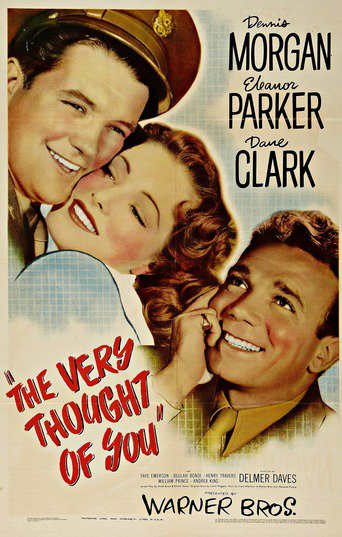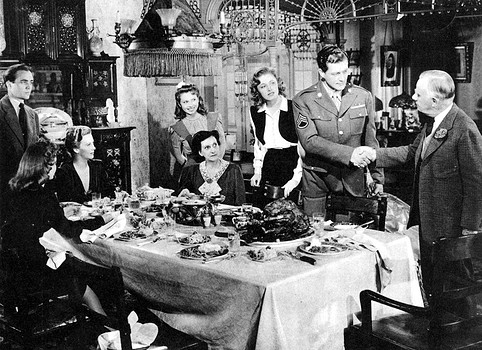 World War II films are my favorite genre. This doesn’t just include films about battle—I love looking at life on the home front, the Army Nurse Corps, and how actors were involved in the war effort in real life.
World War II films are my favorite genre. This doesn’t just include films about battle—I love looking at life on the home front, the Army Nurse Corps, and how actors were involved in the war effort in real life.
Then there are the World War II romance films, which often can involve a quick love affair that leads to marriage. A girl and a soldier meet while he’s on leave, and they marry, hardly knowing each other. They often marry so they will have someone to write home to or the girl falls in love with the uniform (we see this in Best Years of Our Lives).
One of the best in this genre is “The Very Thought of You” (1944). Directed by Delmer Daves and starring Dennis Morgan and Eleanor Parker, “The Very Thought of You” looks at whirlwind wartime marriages, and the disapproval a girl might meet from her family. War era films often show families happily welcoming soldiers into their homes and feeding them sandwiches and milk. But not in “The Very Thought of You”—we see the opposite.
On Thanksgiving Day, Sgt. David Stewart (Morgan) and his wisecracking buddy Sgt. ‘Fixit’ Gilman (Clark) return home to Pasadena after fighting in the Battle of Attu on the Aleutian Islands.
Having no family nearby, David goes to his alma mater to say hello to his architecture professor, who didn’t even realize he was gone. Discouraged, David and Fixit leave and meet Janet on the bus, who David remembers as the girl working at a soda fountain—and she always secretly had a crush on him.
Feeling sorry for the two soldiers being away from their families, Janet invites the men home with her for a combination Thanksgiving dinner and wedding anniversary celebration for her parents.
But Janet’s family doesn’t welcome them with open arms. In fact, they are downright rude. Her mother (Beulah Bondi) doesn’t like the intrusion and criticizes her daughter for being picked up by a soldier because it’s not safe. Her 4F brother (John Alvin) resents the soldiers and calls David a hick. Janet’s sister Molly (Andrea King) also gets upset, because her husband is in the Navy. Molly gives Janet grief because she doesn’t want her sister to be tied to a serviceman like her—Molly is also cheating on her husband. The only welcoming family members are Janet’s father (Henry Travers) and little sister Ellie (Georgia Lee Settle).
After a brief courtship, Janet and David make up their minds to marry, and Ellie, Dad and her friend Cora (Faye Emerson) help her elope. Shortly after their marriage and brief honeymoon, Fixit and David have to ship out.
The rest of the family is angry about the marriage. Molly is vindictive and intercepts David’s letters and urges her sister to leave David and not have his baby. Janet is pregnant and can only wait to see if her husband makes it home from the war. But she wonders why she hasn’t received his letters.
It’s hard to put into words just how much I love “The Very Thought of You.” While Eleanor Parker’s family puts pressure on her to break up what they feel is a crazy fling, she and Dennis Morgan don’t let it ruin their relationship.
And while I love the romance in the film, I also think the dark side of the movie—the resentment and coldness of the family towards the servicemen—is an interesting illustration of realities not often seen on film, especially for this time period (you do see it in the post-war film Best Years of Our Lives).
Delmer Daves both directed and wrote the screenplay for this battle-free World War II film. It has humorous scenes and is heartfelt and poignant. One particular scene that is heartbreaking is when Dennis Morgan goes to visit his old favorite professor who didn’t know he had even left. It showed how siloed the people back home could be while the servicemen were fighting overseas.
“The Very Thought of You” solidified Eleanor Parker as a Warner Brothers star. This film followed a series of B films, and a role in “Between Two Worlds,” her first A film. However, Eleanor Parker wasn’t originally slated to play the lead. Parker replaced Ida Lupino who was ill, according to Eleanor Parker: Woman of a Thousand Faces by Doug McClelland.
It was also was a break through role for Andrea King. This was the first film that she was credited under her stage name, rather than Georgette McKee.
“Andrea King, whom the Warners could pass off for Ida Lupino in a pinch, gives a venomous portrait of Molly. Miss King is definitely a newcomer with a bright future,” said the Nov. 18, 1944, New York Times review (which otherwise wasn’t complimentary of the film).
Andrea King plays the perfect venomous character to contrast lovely Eleanor Parker’s gentleness. While King’s character was hateful to Parker in the film, they were friends offset. King just moved into a house an hour and a half away from the studio, and Parker (who lived five minutes from the studio) offered for King to stay with her. The film took five weeks to shoot, according to the book The Women of Warner Brothers by Daniel Bubbeo.
Parker is sincere and warm in the film and Dennis Morgan—in a non-singing role—is equally earnest as well as extremely handsome. Beulah Bondi does a great job of turning the audience against her while Henry Travers and Dane Clark are there to make you smile.
“The Very Thought of You” is a rare Warner Brothers gem to stumble across. It’s a personal favorite of mine that is easily in my top 10 favorite films. It isn’t on DVD—hey who is going to release this?—and isn’t often shown on television. So if you have the chance to see this one, take it.
As part of Dennis Morgan’s Summer Under the Stars tribute on Turner Classic Movies, “The Very Thought of You” is showing at 2:30 p.m. ET on Aug. 24.
Check out the Comet Over Hollywood Facebook page, follow on Twitter at @HollywoodComet or e-mail at cometoverhollywood@gmail.com






I have fallen in love with Eleanor Parker this year and have been looking forward to watching this film since I saw it in the TCM Guide. Thanks for the review. Now, I’m even more excited to watch it.
LikeLike
I agree This is one of my favorite movies Eleanor Parker is one of my favorites
She was great actress and Mother of four Children
LikeLike
I have seen this several times, and I really don’t know why it has never been released. Another thing that is very typical of the era, but not often portrayed onscreen, is the fact that they take along a younger sibling for a witness even though they are eloping. I have records of this in my 20 years of research. Small, even private, weddings were not uncommon before the war, and even after. Elopements were just as common.
LikeLike
Henry Travers was so wise and loving. I’ve never seen Beulah Bondi so unlikable
LikeLike